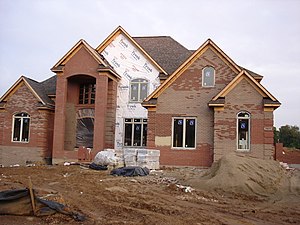 McMansion complete with "lawyer foyer" and all the other trappings of wealth suitable for an end-stage empire. Sadly, a species of "home" not entirely unknown in Salem. Image via Wikipedia
McMansion complete with "lawyer foyer" and all the other trappings of wealth suitable for an end-stage empire. Sadly, a species of "home" not entirely unknown in Salem. Image via Wikipedia
We're driving slowly and stopping often, primarily because the Obama administration's Keynesian approach to saving the industrial economy necessitates throwing money at the highway departments of every state in the country. The attendant "shovel-ready projects" are clear examples of the lengths to which industrial humans will go to sustain the unsustainable, maintain the immaterial, and generally restore the irredeemable for a few more months.
The many miles and frequent pauses reveal to any sentient animal the sheer lunacy of the living arrangements we've built for ourselves. Within the span of a couple generations, we abandoned a durable, finely textured, life-affirming set of living arrangements characterized by self-sufficient family farms intermixed with small towns that provided commerce, services, and culture. Worse yet, we traded that model for a coarse-scaled arrangement wholly dependent on ready access to cheap fossil fuels. Then we ratcheted up the madness to rely on businesses that use, almost exclusively, a warehouse-on-wheels approach to just-in-time delivery of unnecessary devices designed for rapid obsolescence and disposal.
Simply ingenious, wouldn't you say?
The entire region, formerly abundant with a multitude of edible crops, currently is brimming with a single commodity: #2 corn. It's Roundup-ready, at that, just to throw a bucket of insulting acid into the face of reason. Roundup-resistant weeds are popping up throughout the region as we bring Farmageddon to the heartland and eventually to the world. Most of the corn, which is essentially inedible until it is processed (i.e., pummeled with inordinate quantities of fossil fuels), is watered with the last remaining drops of the Ogallala aquifer, brought to the surface with the same finite fluid used to power our trucks and cars. Verdant fields of ethanol dreams are interrupted occasionally by a field of soybeans; without rotations of legumes, the soil would be so depleted of nitrogen by king corn, it wouldn't support even the great corn desert. The corn fills our bellies with death-inducing faux sugar. But we willingly trade some of that "food" for fuel because the associated dependence on automobiles allows us to burn off the final inches of life-giving topsoil to promote our culture of death in rapid-transit, individualized death-traps. Who could pass up a deal like that?
Obnoxiously ubiquitous cell-phone towers line the edges of the cornfields adjacent to the Eisenhower Interstate Highway System ("Celebrating 50 Years, 1956-2006"). Each of these completely unnecessary towers of mortality -- which serve only to duplicate extant infrastructure -- kills 5,000 to 15,000 birds each year. Yet every imperialist has a cell phone, regardless of the death to songbirds. Don't even get me started on the col-tan in the cell-phone batteries mined from the Congo, because I'd rather not think about the brutal lives and tortuous deaths of the Congolese women and children we treat as collateral damage along our imperial path.
Seemingly every tenth cell phone marks a casino, yet another ubiquitous structure we'd be far better off without. These businesses extract money from the poor as they pursue the something-for-nothing goal upon which our culture has become based during the last few decades.
If it's not a casino, it's a distribution center for this country's rapidly waning commercial sector. We no longer make much of anything in this country, but we move around ton after ton of cheap plastic crap to the Targets and Wal-Marts that have displaced family owned businesses in every town and city in the country while exporting disaster capitalism throughout the world.
Finally, then, we come to the most ludicrous part of the entire endeavor: suburbia, filled with McMansions. This not-quite-country, not-quite-city living arrangement requires people to buy one of everything for every house -- except cars, of which we need at least two -- to live far from work, far from play, and far from the things we "need" to buy. Hundreds of acres of shoddily constructed, castle-like symbols of self-indulgence are separated from equally coarse-scaled places we use to grow "food," conduct "commerce" in our "service" economy, and otherwise live civilized lives. As has often been the case, today's symbols of gluttony are tomorrow's death traps.
As usual, I'm quick to point out the silver lining in this otherwise disastrous narrative: Better days lie ahead. How could they not?
In the near future, we'll return to a durable set of living arrangements. Since we need about 50 million additional gardeners to support the 300 million people in this nation, and because nearly everybody in the industrialized world would rather push electrons in a cube farm than push a shovel in a garden, I don't foresee us voluntarily returning to the agrarian age. Not only are a majority of people unaware of the predicament we face -- thanks to the media, every level of government, and our own self-absorbed preference for the bliss of ignorance -- but there's simply no leadership in the industrialized world as we face an inevitable but unprecedented economic contraction. As a result, I suspect we'll bypass agricultural pursuits and plunge right back to the post-industrial stone age. Once again, daily life will be characterized by a finely textured, life-affirming, durable set of arrangements characterized by respect for each other and reverence for the land, and accompanied by a solid dose of self-sufficiency.

![Reblog this post [with Zemanta]](http://img.zemanta.com/reblog_e.png?x-id=888c70c6-be91-44f0-ae3a-fcf6506953ca)




No comments:
Post a Comment